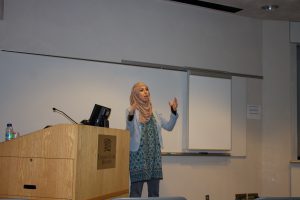By Faith Boyum
Staff Writer
Faith.boyum5336@mb.rctc.edu

Regina Mustafa says 81 percent of media stories printed about domestic terrorism have Muslim connection, but the FBI says that just 6 percent are related to Muslims. (Echo Photo by Munira Alimire)
Every day, the media works to keep the public informed about major events and opinions, but sometimes it can spread negative thoughts and feelings as well, which Regina Mustafa explained in her presentation “Muslims in the Media” at RCTC on May 1.
Mustafa is Muslim herself, and she advocates peaceful relations between Muslims and people of other faiths in many ways, both through Community Interfaith Dialogue on Islam, an organization she founded in 2014, and raising awareness as this presentation did.
Many people make assumptions and create stereotypes about who they think Muslims are, she said. People hear about the awful things that the extremists are doing, and they believe that all of them are like that, creating a mental picture in which all Muslims are intolerant, barbaric people.
“That’s a very distorted version,” said Mustafa, who was a guest speaker in the Art + Design Lecture Series.
Some of this is could be a leftover from 9/11, since Muslims have continued to be portrayed negatively in the media, even though Mustafa said that one is much more likely to be killed from a piece of defective furniture than a Muslim extremist. Yet 81 percent of stories printed about domestic terrorism have Muslim connections, even though according to the FBI, about 6 percent of domestic terrorist acts are actually suspected to be related to Muslims.
This is a tiny percentage of the total acts of terrorism, but people still hold on to their preconceived notions and feed their fears about those who are different from them, forcing the majority of Muslims to answer for the actions of those who choose to commit crimes in the name of religion.
This is not only unhealthy for Muslims and non-Muslims, but it is especially a concern for the younger generations.
“What does that do to young Muslims?” Mustafa asked. How will this make them feel about themselves and their families?
If the youth of different backgrounds and different faiths are unable to overcome these messages and learn to build peaceful relationships, the cycle of hate and distrust will continue.
However, there are ways to work toward dissolving the misconceptions and attitudes towards Muslims. It really boils down to having a conversation with the people who disagree and have negative feelings about Muslims because you can’t make progress if people will not talk to each other. It may not change everyone’s mind, Mustafa said, but it is a step in the right direction
